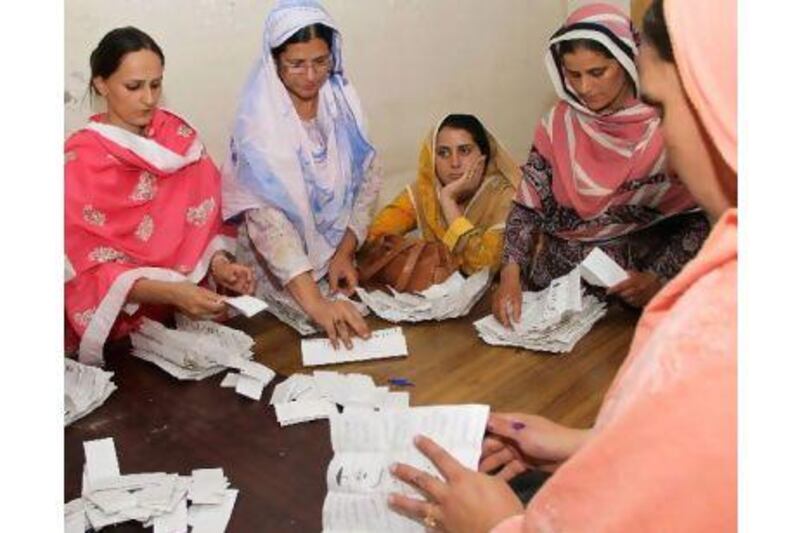ISLAMABAD // The party of Pakistan's president, Asif Ali Zardari, romped to an easy victory in elections held in part of the disputed territory of Kashmir on Sunday.
Pakistan's dispute with India over the territory, which has sparked four conflicts since independence in 1947, was sidelined in a campaign dominated by Pakistan's two biggest political parties.
The closing two weeks of electioneering turned into a personal contest between Yousaf Raza Gilani, the Pakistani prime minister, and Nawaz Sharif, the man who aims to replace him at the next general election, scheduled for not later than January 2013. The exact date is left for the government to decide.
Mr Sharif, a two-time prime minister, is of Kashmiri descent.
The regional offshoot of the Pakistan People's Party (PPP) secured victory in 19 of the 36 contested seats to the Azad Kashmir legislative assembly.
It trounced the Pakistan Muslim League-Nawaz (PML-N) party of Mr Sharif, which won nine seats, while the Muslim Conference party of Sardar Attique Ahmed, the outgoing prime minister, was pushed to third with just four seats.
The PPP secured enough seats to form a government but, as results piled in late on Sunday, Mr Gilani telephoned Mr Ahmed and "invited him to work together for the development of Kashmir", a statement issued by the prime minister's office said.
The offer was accepted, it said.
The proposed coalition mirrors a similar arrangement between the Pakistan Muslim League-Quaid party and the PPP, quietly formed shortly after the killing on May 2 of Osama bin Laden.
Like the alliance in Islamabad, the proposed Kashmir coalition government has been formed under a philosophy of "political reconciliation" espoused by the PPP.
The PML-N, however, has complained that the alliances have been formed to deny it victory at the forthcoming general election.
Through a series of coalition arrangements, the PPP enjoys a clear majority in the National Assembly, the directly elected chamber of parliament, and is in government in three of Pakistan's four provinces. It also leads the government of Gilgit-Baltistan, a region of Kashmir administered separately by Pakistan, after running away with an election held there in November 2009.
Punjab, the most populous province, is ruled by the PML-N.
Polling on Sunday was marred by disputes, particularly in the 12 seats allocated to Kashmiri migrants living across Pakistan.
Two political activists were killed in isolated clashes.
Voting for Kashmir assembly seats in the Punjab was also marred by accusations of interference by the province's PML-N administration.
Rehman Malik, the interior minister, told reporters in Islamabad on Sunday that he had asked the election commission to seek an explanation from the Punjab administration for its refusal to allow federal paramilitary troops to provide security at polling stations.
He said the Punjab government had also refused to allow federal government employees to serve as polling officers, instead insisting that its officials performed the role.
Pakistan's constitution defines the Kashmir elections as a federal matter, with provincial governments responsible only for law and order outside polling stations.
Voting was cancelled in one constituency centred around Sialkot, amid accusation of rigging, led by the information minister, Firdous Ashiq Awan, who represents a National Assembly seat in the area and led the PPP campaign there.





